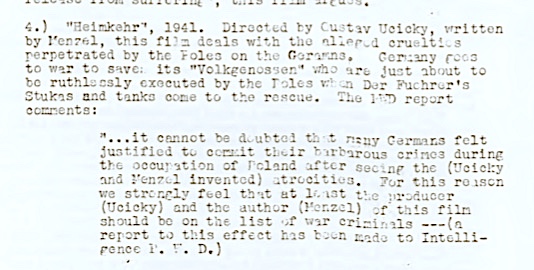- Home
- POSTER GALLERY
- ❗️BOOK & POSTER STORE❗️
- About the Posters
- The William Gillespie Collection
- Our Publishing House
- ❗️GFDN interviews author and collector William Gillespie ❗️
- Our most expensive & inexpensive finds!
- ❗️***NEW!*** Poster of the Month ❗️
- ❗️NEW ❗️Film Posters – Demands on an important means of film advertising. ❗️
- In our Book + Zeitschrift Library
- ❗️ ***NEW!*** Hitler Youth Quex – A Guide for the English–speaking Reader ***NEW!*** ❗️
- ❗️***NEW!*** Table of Contents of our new HJ QUEX book❗️
- ❗️Hitler Youth Quex Guide - early praise! ❗️
- Recent loans from the Collection
- Farewell Horst Claus. (1940–2024)
- "Der Deutsche Film" Zeitschrift
- ❗️ ***NEW!***German "Tendency" Films (Tendenzfilme) in the Third Reich ❗️
- KARL RITTER
- Karl Ritter original film posers in this Collection
- "Besatzung Dora" ( † 1943)
- "The Making of The Crew of the Dora"
- Karl Ritter at the 1938 Reichsfilmkammer Congress
- INDEX -"Karl Ritter" book, 2nd edition
- Karl Ritter's Legion Condor (1939, unfinished)
- Excerpt from our "Dora" book
- ∆∆∆∆∆ High praise for our DORA book! ∆∆∆∆∆
- TABLE OF CONTENTS – "Legion Condor"
- § § § § § Early Praise for our LEGION CONDOR book! § § § § §
- ❗️"Das Leben geht weiter" and Karl Ritter ❗️
- Zarah Leander Europe–wide !
- Japan Military Film and Karl Ritter
- Karl Ritter after 1945
- 1935 Film Congress
- Poster Exhibition in Berlin, March 1939
- Potsdam poster exhibition 12 April–25 August 2019
- Leni Riefenstahl's two "Olympia" Films (1938)
- "Ohm Krüger" (1941)
- Emil Jannings
- "Blutendes Deutschland" (1933)
- Hannes Stelzer ( † 1944)
- Klaus Detlef Sierck ( † 1944)
- Film stills
- Reich Film Censorship Offices
- ❗️Dateline: Ufa - April 11, 1945 ❗️
- ❗️***NEW!***The Fate of the German Film Industry in May 1945 ❗️
- Film censorship cards
- Film Archives
- Cinema advertising
- School filmstrips
- ❗️UPDATED❗️ Z F O / Ostland Film G-m-b-H
- Z F O / Herbert Jacobi estate
- ZFO / Ostland Film newspaper articles
- ❗️***NEW!*** Roter Nebel / Red Fog / Red Mist (1942/1943, ZFO) ❗️
- ZFO - Der Rückkehrer - The Returnee (1943/1944)
- The D F G production company
- D I F U
- ❗️ ***NEW!*** "Carl Peters" – Special Collection. ❗️
- "Alcazar" (1940, Genina)
- "Der 5. Juni" (1943, banned)
- ❗️ ***NEW!*** Herbert Selpin and his "Titanic" (1943) ❗️
- ❗️ ***NEW!*** Ein Robinson (1940, Fanck) ❗️
- "Fronttheater" (1942)
- Veit Harlan's Jud Süß and Fritz Hippler's Der Ewige Jude
- Harlan "Jud Süß" trial 1949
- Werner Krauss & JUD SÜß
- Anti-Semitic Film Posters in the Collection
- "Heimkehr" (1941)
- "Hitlerjunge Quex" (1933)
- ❗️***NEW!*** Hitlerjunge Quex in 111 Greater Berlin Cinemas ❗️
- Jürgen Ohlsen
- "S.A.Mann Brand" (1933)
- "In der roten Hölle" (Edgar Neville, 1939)
- "Helden in Spanien" (1938)
- The Spanish Civil War in Film
- Andrews Engelmann (1901 – 1992)
- Deutsche Wochenschau
- Uƒa Feldpost
- Uƒa Kulturfilm – Informationen
- " Die Tochter des Samurai" (1937, Fanck)
- Ufa 25th Anniversary
- Invitations to world premieres
- ❗️***NEW!*** Continental Films, Paris 1940–1944 ❗️
- Film Censorship in Occupied Paris 1942
- "Der Sieg des Glaubens" (1933)
- Wilhelm Althaus Estate
- Weimar Germany posters
- Ufa and the Ordensburgen
- The Gaufilmstelle in our Collection
- "Zwei Welten" (1940)
- "Capriccio" (1938) –Karl Ritter film album
- Unrealised NS Propaganda Films 1934–1945
- German Film Directors accused of "war crimes"
- Australian––themed NS feature films
- "Der Störenfried" / "The Troublemaker"
- What was new in 2014?
- What was new in 2015?
- What was new in 2016?
- What was new in 2017?
- What was new in 2018?
- What was new in 2019?
- What was new in 2020?
- What was new in 2021?
- What was new in 2022?
- What was new in 2023 ?
- What's new in 2024?
- ❗️***NEW!*** Hitler assassination attempt in Karl Ritter film cut❗️
- BESATZUNG DORA private photos
- Just discovered 1942 article on BESATZUNG DORA
- The Karl Ritter Tetralogy
- Google Analytics 2023
- Our first–ever acquisition!
- ❤️"Some of our favourite things....!"❤️
- ERRATUM for our " Hitler Youth Quex Guide"
- Trending
- Vale †
- Our Wants List / 2024 / Wunschliste
- Pop Quiz
- Unsere KARL RITTER Bücher in Deutschland liefbar!
- WHERE to buy our books right now?
- ✉️Contact
 “History is not about the facts. It is about the context and who is telling the story.” —Prof. Milton Fine.
“History is not about the facts. It is about the context and who is telling the story.” —Prof. Milton Fine.
"Who controls the past controls the future: who controls the present controls the past." –– George Orwell in his novel "1984."
"Whoever doubts the exclusive guilt of Germany for the Second World War destroys the foundation of post–war politics." –– Prof. Theodor Eschenberg, Rector, the University of Tübingen.
"If we have our own why in life, we shall get along with almost any how." – Friedrich Nietzsche
POSTER GALLERY --view
over 500 German film
original posters between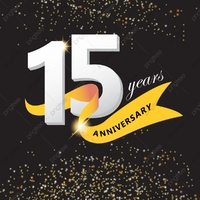
1927–1954 from
Germany and from
many Axis and Neutral countries
across Europe!
Note! Posters in the Poster Gallery are PERMANENT
acquisitions which are NOT FOR SALE!! ONLY the
posters listed in our POSTER STORE are for sale.
(They have a price and order button to use.)
German film directors accused of "war crimes"
and "crimes against Humanity" with a movie
camera by the Soviets and Western Allies.
At the end of WWII, German film directors were being sought by the Allies and the Soviet Union to be prosecuted for "crimes against humanity" and/or "war crimes" for making propaganda motion pictures for the Third Reich. As the charge of "war crimes" was invented ex post facto as a method to prosecute and execute Nazi leaders at Nürnberg, it also led to the first–ever charges against a film director since the arrival of motion pictures. Veit Harlan was duly charged and he had to endure two trials -- after he was found not guilty at the first one in 1949, the powers-that-be attempted to convict him a second time, but once again failed. Our Karl Ritter archives hold the Soviet Communist Party newspaper of 8 September 1945 (Deutsche Volkszeitung, Berlin) demanding that the Americans try Ritter for war crimes, as the director was in a US POW prison at the time. Similarly, an American OSS secret report issued that same month cited the anti–Polish film Heimkehr and recommended that its Director Gustav Ucicky and its script-writer, Gerhard Menzel, both be charged with war crimes. The Americans thus showing that they were just as vicious and vengeful as the Soviets. Luckily only Veit Harlan was ever charged with such "crimes" and after his two trials ended in failure, no other German film directors and senior film producers were tried, excepting those held in Soviet prisons and concentration camps such as film director H.H. Zerlett, Gustav Rathje, the Production Manager of Ritter's GPU, and Ewald von Demandowsky, Reichsfilmdramaturg and former Head of Production at the Tobis Film company, who were all executed. We are continuing our research on other German film victims of Soviet post–war terror.
Against HEIMKEHR - anti–Polish film 
BELOW: The OSS secret report of September 1945 recommending war crime charges be laid against Gustav Ucicky and Gerhard Menzel because of the film Heimkehr :
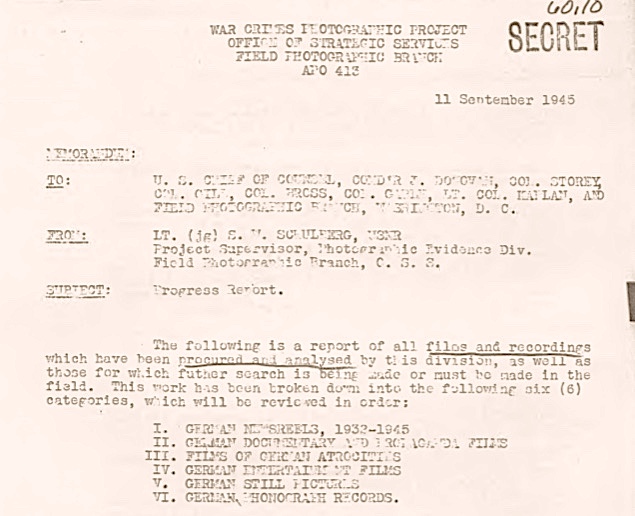
The "experts" who examined captured film for possible war crimes are named in this OSS Report as:
In 1948 Soviet-run Poland, in lieu of having Heimkehr's director Ucicky available for trial, the unfortunate Polish actors who survived the war or assassination by the Resistance were put on trial for "the most serious crimes against the Polish people" for their participation in Heimkehr and were called "slaves of German fascism." The photo below shows them in November 1948 in the courtroom during proceedings. They were sentenced to long terms of imprisonment for their acting in the film.
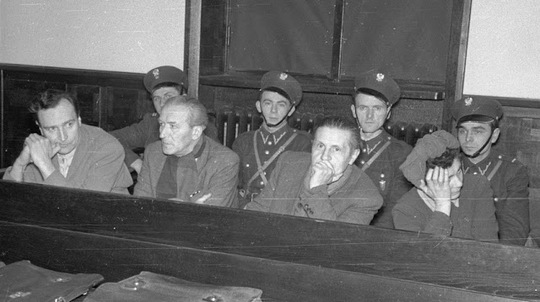
Against HITLERJUNGE QUEX / GPU / POUR LE MÉRITE and other Karl Ritter films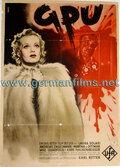
BELOW: On 29 June 1945 in the Communist Party paper “Deutsche Volkszeitung’ in the Soviet Zone an article appeared entitled “Film-maker and War Criminal’ in which it was said: “Among the internees in Rosenheim prison you will find the film producer and director Karl Ritter, who led through his master work Hitlerjunge Quex the systematic poisoning of German youth and through his film GPU dangerous hateful lies about foreign relations. With the artistically just as worthless imperialist tendency films Deutschland ueber Alles ( sic. — meant is Über alles in der Welt ), Urlaub auf Ehrenwort, and Pour le Mérite he has placed himself in the row of active war criminals. For the judges here lies a particular case in front of them, where the taking of evidence and the opinion of the facts of the case of war criminality is not reconstructed from files and testimony, but rather, so to say, is reproducible live at any time.’

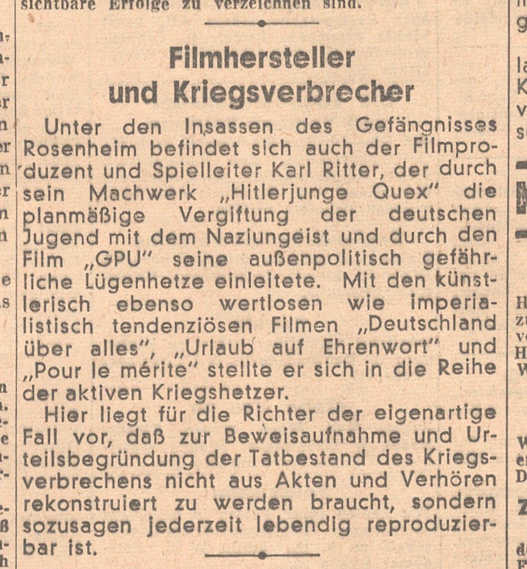
The total hypocrisy of the Allies against Ritter was blatantly exposed in the 1950s when his anti–Soviet film GPU was released in the USA and UK as The Red Terror. A rare American film still from our Collection:
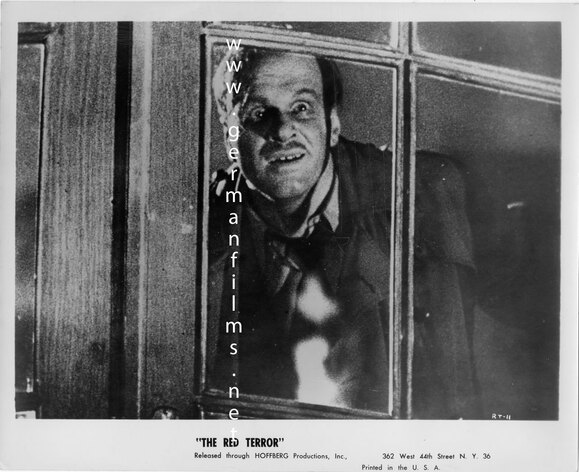
Against JUD SÜß - Veit Harlan indicted in the only trial which proceeded.
BELOW: Veit Harlan sitting in the Hamburg court room, 1949, charged with "crimes against Humanity" for his film Jud Süß.
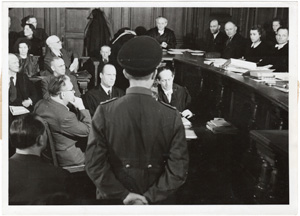
The 1949 trial generated intense interest worldwide and huge media coverage. See our special page on the Trial here.
Against Riefenstahl's TRIUMPH DES WILLENS 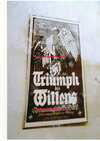
"Although the film was one of the most widely distributed and powerful propaganda films made in Nazi Germany, Riefenstahl was not charged with war crimes."
This comment is found on the website of the United States Holocaust Memorial Museum in Washington, D.C. Committing "war crimes" with a motion pictures camera still seems to be considered valid unless you were a Soviet or American film director.
Against Film-maker Hans Zöberlein:
Hans Zöberlein produced two films, Stoßtrupp 1917 and Um das 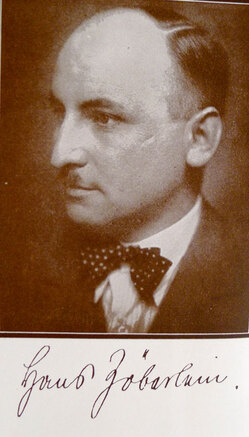 Menschenrecht -- both considered outstanding, highly authentic WWI and Freikorp era films. We have the original posters for these films in our Poster Gallery.
Menschenrecht -- both considered outstanding, highly authentic WWI and Freikorp era films. We have the original posters for these films in our Poster Gallery.
Although there was an official effort to instigate charges, Hans Zöberlein was not prosecuted after WWII for making these films, so did not, unlike Harlan, face charges of using a motion picture camera in a "crime."
On April 28th, 1945, Hans Zöberlein acted as leader of one of the notorious "Werewolf" commands in the foothills of the Alps. After a left–wing resistance group of the Upper Bavarian town of Penzberg deposed the NSDAP mayor in order to surrender without further losses, Zöberlein had sixteen persons executed as traitors. For this "Penzberg murder night" the author was first sentenced to death in 1948, later commuted to life imprisonment, but then he was released in 1961 for health reasons. On February 13, 1964, he died in Munich.
